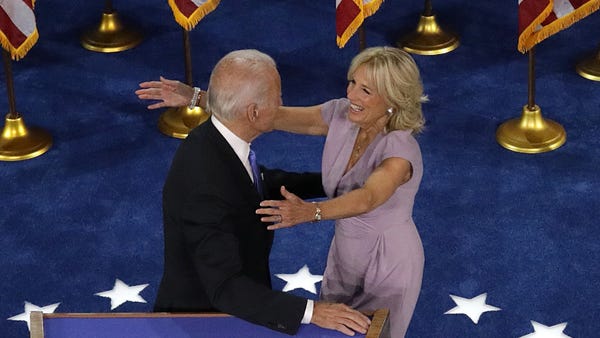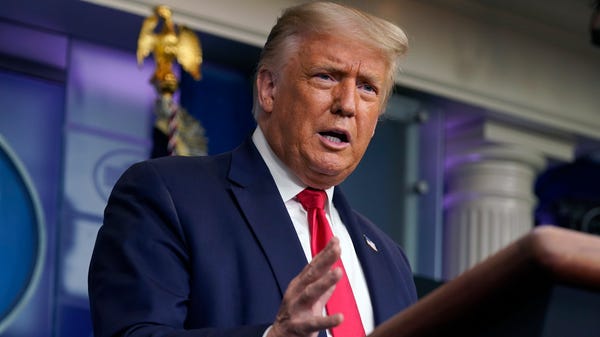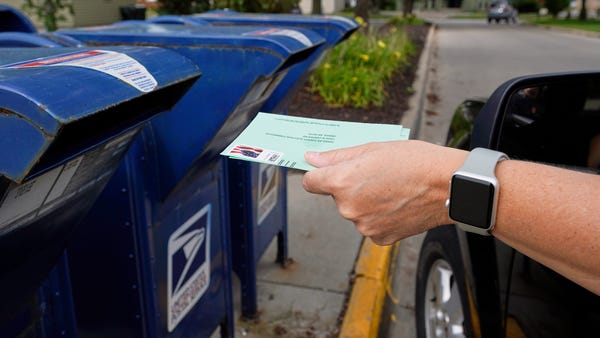 |
| |
| |
| |
| |
| |
| |
| It's hump day and there haven't been any major catastrophes today in politics. I'm calling that a win! |
| So what's going on? Continuing on his spree of unwinding former President Donald Trump's policies, President Joe Biden on Wednesday signed another raft of executive actions tied to combating climate change, prioritizing science and evidence-based policy across federal agencies, and pausing oil drilling on public lands. |
| Also: Biden is still grappling with how to unify a nation — and Congress — that has at times been bitterly divided. |
| It's Mabinty, with the political news you need to know. |
Climate change is now a national security concern |
| The executive actions Biden signed Wednesday afternoon: |
| • | Elevate climate change as a national security concern | | • | Commit to the goal of conserving at least 30% of all federal land and water by 2030, which stands at 12% today | | • | Build on his economic policy agenda to direct federal agencies to "procure carbon pollution-free electricity and clean, zero-emission vehicles to create good-paying, union jobs and stimulate clean energy industries." | |
| Biden had pledged to be the most aggressive president on climate change, which he has called "an existential threat." His goal is to decarbonize the U.S. power sector by 2035 on the way to reaching net-zero greenhouse gas emissions by 2050. |
| "We've already waited too long to deal with this climate crisis," Biden said from the White House State Dining Room. "We can't wait any longer. ... We know it in our bones. And it's time to act." |
| Who's happy about it? Environmentalists. The League of Conservation Voters applauded the plan, describing it as a "whole of government approach that puts bold climate action, clean energy, and environmental justice at the heart of their domestic and foreign policy agenda. |
| Who's not so hot about this? Wyoming Sen. John Barrasso, who is set to become the top Republican on the Senate Committee on Energy and Natural Resources, called Biden's orders "divisive and illegal." |
OK, how realistic is all of this? |
| Biden's prospects of pushing through his ambitious priorities on COVID relief, racial justice and climate change certainly improved when Democrats won both Georgia Senate seats – and full control of Congress – earlier this month. But Biden's team acknowledged that congressional action will be required to achieve much of Biden's early agenda. Topping that list is the passage of a $1.9 trillion COVID-19 relief package, dubbed the American Rescue Plan. |
| But the retention of the Senate filibuster – a congressional tactic that essentially requires 60 Senate votes to get bills passed – means the new president might have to rein in some of his most progressive ideas because the moderates in both parties he'll need to pass legislation won't go for them. |
| If you forgot what a filibuster is, let me remind you: The filibuster is a long-standing tool used by senators in the minority to block a vote on a bill by basically endlessly debating the measure. The only way to stop debate and force a vote is if 60 members agree to do so. |
| Democrats only have 50 votes – not enough to stop debate and force a vote if Republicans decide to filibuster. |
| The good news for Biden is that most Americans say they want to see bipartisanship in Washington, according to a recent Monmouth University poll. Notably, a new poll shows 71% of Americans would prefer Republicans in Congress find ways to work with Biden, compared to the 25% of Americans who would rather they serve as a check on the president's agenda. |
More news you need to know: |
| |
| Today's tip: Breathe, Stretch, Shake, Let it Go. —Mabinty |
| |
| |
| MUST-READ ELECTIONS 2020 NEWS |
| |
| |
| |





No comments:
Post a Comment